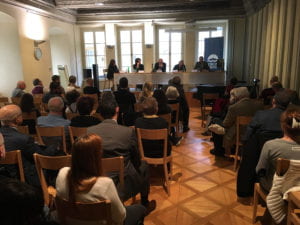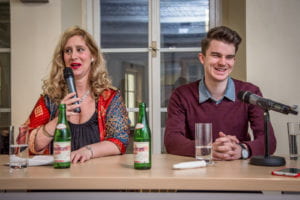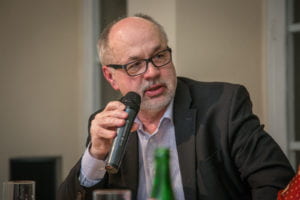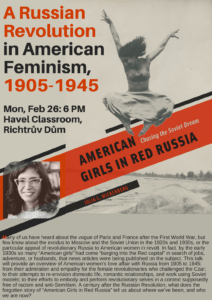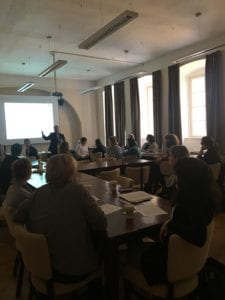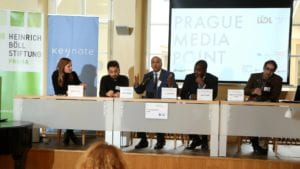Every year, NYU students intern at the Forum 2000 conference – an international event started by former Czech President Vaclav Havel and Nobel laureate Elie Wiesel to promote human rights and democracy. Below you can read the reflections of three students whose job was to write summaries of the panels for the Forum 2000 website and social media. Spending three days in Prague’s sumptuous Zofin Palace, the students rubbed elbows with world leaders, famous journalists and human rights activists as they discussed the conference theme, “Is Democracy Too Old for Young People?”
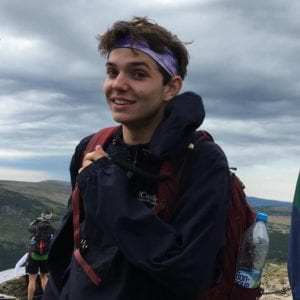 Kevin Hanley (Politics major,Liberal Studies)
Kevin Hanley (Politics major,Liberal Studies)
Flanked by six guards, Albert the II, Prince of Monaco, entered the lecture hall followed by a round of applause. He spoke of climate change and the impending danger we face. He spoke of non action as the greatest risk to our survival. His speech was short and to the point, unlike the rest of the conference.
The panels that consumed the conference were long and thought provoking, calling upon audience members to ask questions often. At the panel sharing the namesake of the conference, “Is Democracy Too Old for Young People?” dignitaries and millennials alike spoke about the political and philosophical implications of youth shifting away from democracy. Esteemed political philosopher Ramin Jahanbegloo had a very worthwhile quote when the discussion shifted to democracy and capitalism: “Democracy is about emancipation of human beings, and capitalism is about domination of human beings.” Mete Coban, a Labour Councillor for Stoke Newington and founder of My Life My Say, provided a first hand view of the recent Brexit vote and how to remedy the youth’s dissatisfaction for politics in the UK. The youth of the UK actually became very invested in the Brexit vote, but without knowing much about the implications of leaving the EU. Education, Coban said, is at the crux of the current apathy towards democracy spreading across the EU.
One of the most interesting discussions came in a panel about protecting democratic norms and institutions. In light of Russian meddling in US and EU elections, the question arises: how do we protect our institutions in a technologically advanced world? Ken Wollack, President of the National Democratic Institute, made the important distinction that Russian propaganda now is very different than that of the Cold War. Rather than try and pull people into Russia, Putin is trying to peg everyone on the world stage down to Russia’s level. The three major takeaways from this panel were 1) that democracy is in danger, even more today than thirty years ago 2) the western world is still strong enough to defend its values 3) institutions are crucial to holding democracy together.
Throughout the conference, my views about democracy and the world were called into question and reaffirmed almost simultaneously. From speaking to different panel participants and audience members, I got a sense that everyone took different things away from the conference depending on their notions about democracy going into the conference. Nevertheless, I came out just as optimistic as I went in, and that’s all I can really ask for.
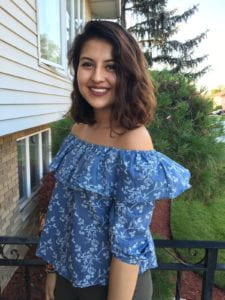 Alejandra Torres (Gallatin)
Alejandra Torres (Gallatin)
When I first heard about Forum 2000, I registered online. It sounded like such an amazing opportunity to listen to and be inspired by the ideas and projects of brilliant world leaders. It was a shame that I had not heard about it on the NYC campus.
. An internship at Forum 2000 was simple: my presence at certain panels would be mandatory as I was to write reports on them. These reports would later be circulated on social media, online news sites, etc. to summarize this year’s success and promote future conferences. It was up to me to be a good listener and note-taker, and a good writer. I will admit that this latter part made me nervous. What if I was not as attentive as I should have been and did not properly transcribe or articulate what was expressed by the former president of a country?
Thus, while I was deciding which internship to accept, I exchanged several emails with Sera, trying to make the most informed decision. I also wanted an internship to extend beyond the conference. I absolutely love the fact that NYU Prague offers non-credit internships because I was hoping to be able to have an opportunity to continue gaining work experience during my time abroad. More importantly, I was searching for ways I could be more involved in Prague, learn more about Czech culture and interact with people outside of NYU. When Sera assured me that she would send me examples of past reports and that I could go into the office on Tuesdays (my day off) post-conference to work on assorted tasks, I was sold.
Writing this exactly a week after the initiation of the conference, I am so happy and blessed to have been offered this internship. I was impressed by several factors that frankly, far exceeded my expectations. The Forum 2000 Foundation was able to book gorgeous venues for the conference, it secured a plethora of incredible panelists who have been doing amazing things in their respective nations as well as in the global community, and it is so well established on the international arena. Walking into the opening panel, I felt like I was part of something big. The excitement and desire of the speakers and audience members to be agents of change was as palpable as my nervous, shaking legs.
I attended the opening panel, “Changing the International Order and the Future of Our Planet,” “Central Europe: 20 Years From Now,” “Austria and Europe;” “Religion and the Crisis of Democracy,” and “To End a War: The Colombian Peace Process.” Admittedly, there were times during these panels when I was so enthralled by the elegance, eloquence and intelligence of the speakers as they debated how to strengthen democracy in uncertain times, that I would forget that I was more than just an audience member seeking to be inspired. I had a job to do so, of course, I would quickly recover! There were many times when I agreed with what the panelists said that I would find myself silently snapping my fingers in between note-taking. At other times, the interdisciplinary approaches offered by the speakers challenged my own view points. Certainly, I left the conference with the sense that my world perspective expanded and became more enriched because some panelists pushed me to think more critically and look beyond the surface of global issues.
Prince Albert II of Monaco taught me that knowledge and awareness are critical tools to solving any type of problems; Iveta Radičová, the former Prime Minister of Slovakia, taught me that tolerance, trust and solidarity are crucial elements of liberal democracy that must be reawakened in order to improve the current political climate. Heinz Fischer, the former president of Austria, instilled in me the importance of international unity, cooperation and solidarity to address global crises.
The rush of submitting reports before the deadlines was exhilarating and empowering. In what may appear to be a childish reaction, I felt like a real adult because I have never had such fast-approaching deadlines. It was definitely good preparation for my future career. My work felt important because my supervisors relied on me to comprehend a panel that they were unable to attend. In finding the time to write my reports right after the panels concluded, I was able to also better understand in what I had participated. I was better able to clarify my own thoughts. In short, writing the reports was not only my job but it was a form of academic and personal reflection.
As I wait for my reports to be reviewed and edited, I am excited to see them once they are published. It will be a testament to my presence and experience at an amazing conference which, a week later, still seems so surreal; it will be a testament to my work and appreciation of the opportunity presented to me. I am also happy to continue working with the Forum 2000 Foundation because I will be focusing on a proposal to engage the NYU campus in New York in next year’s conference.
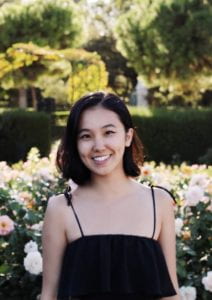 Ashley Jia (Stern)
Ashley Jia (Stern)
I wasn’t sure what to expect when I applied to Forum 2000, but I did know that I wanted to be more involved in politics. I’m no political science major, but as Jon Gnarr, former mayor of Reykjavik said, “maybe people who are not into politics should go into politics.” Sometimes that doesn’t work out so well, but I thought I’d give it a try.
The Forum 2000 Foundation provides a platform for global leaders and thinkers from around the world to discuss and debate critical issues surrounding democracy and the development of civil society. This year’s conference centered around “Strengthening Democracy in Uncertain Times,” and naturally, my reports examined current populist crises in Europe. I listened to MPs, professors, mayors, editors, political scientists—you name it—discuss and analyze just about everything when it comes to the rise of demagogues, whether that be institutional failure in Poland and Hungary or globalization in western countries.
Though all the panels offered compelling discussion, my most interesting experience was reporting on a working breakfast at the French Embassy. The room was lavish, the breakfast was lavish, the people appeared important—forget about being a finance major amongst all the other political science major interns; now I really felt out of place. I did not think too much of it at first, but as I was rapidly typing away and shoving croissants down my throat (shout out to Forum 2000 for the incredible pastries), I suddenly hear a man seated a few spaces away from me be addressed as “His Excellency.” No wonder the pastries were so good. If they’re good enough for that guy, they’re good enough for me.
In all seriousness though, this experience has been incredibly rewarding. Having reported on this conference and listened to numerous panelists, I think that it is imperative for young people to become more active in their local communities and to be more understanding of conflicting viewpoints. With so much polarity in society today, positive change cannot materialize without action and a little compromise.
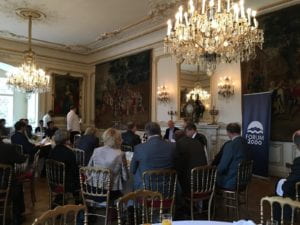
Photo by Ashley Jia
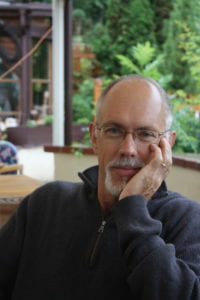 Like Czech history, Mark Slouka’s life has been accentuated by the number 8. In 1948, his parents escaped from Communist Czechoslovakia. Ten years later, in 1958, he was born into a “Czech speaking ghetto in Queens, NY.” The family first returned to Prague on a visit in 1968, and in 2018, Mark and his family made a permanent move to Prague.
Like Czech history, Mark Slouka’s life has been accentuated by the number 8. In 1948, his parents escaped from Communist Czechoslovakia. Ten years later, in 1958, he was born into a “Czech speaking ghetto in Queens, NY.” The family first returned to Prague on a visit in 1968, and in 2018, Mark and his family made a permanent move to Prague.
